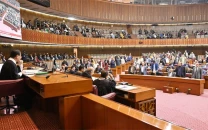Teaching methodology: Loopholes affect education
Call for introducing interactive modes of teaching.

For better learning of the students, the loopholes in the methodology being employed by the teachers needs to change. Using obsolete methods and forming a “removed relationship” with a student does not help the cause of education.
This was pointed out at a training workshop organised by Sustainable Development Policy Institute (SDPI) on “Interpersonal Communication and Teaching Skills and Social Accountability in Education” on Wednesday.
The training was aimed at introducing social accountability tools to public schools teachers and equipping them with the necessary communication skills to enhance the quality of their interaction with students.
The training was organised to address serious gaps identified in a study and a survey of Citizen Report Cards (CRCs) on education recently carried out by SDPI in two slums in Islamabad -- Alipur Farash and Hansa Colony.
SDPI Senior Advisor Ahmad Salim Khwaja called Pakistani classrooms “control rooms” and urged on the need to introduce interactive modes of teaching where teachers and students can freely interact in a congenial learning environment.
Shanaz Tareen, a former K-P education department official, was of the view that teaching and preaching are similar and said a child can only become productive member of society when he is allowed spiritual, physical and mental development through quality education.
Quaid-i-Azam University Professor Rao Nadeem deliberated that teachers cannot earn respect unless they treat students with love and affection.
He said teachers must communicate and channelise information in such a way that children can easily grasp the knowledge.
Published In The Express Tribune, June 21st, 2012.



















COMMENTS
Comments are moderated and generally will be posted if they are on-topic and not abusive.
For more information, please see our Comments FAQ